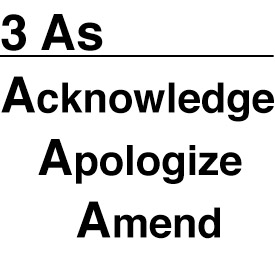Westside Toastmasters is located in Los Angeles and Santa Monica, California - Westside Toastmasters on Meetup
Restoring Credibility
Credibility is the bond between leader and follower; it is almost sacred because it forms the bedrock of why people want to do what leaders ask them to do. Sometimes a loss of credibility occurs because the leader makes a mistake. Think of leaders who fail to fulfill their promises. Other times circumstances conspire against the leader and, through no fault of his or her own, problems arise. Think of economic slumps. None of us is perfect, even leaders. If a leader's credibility becomes damaged, what can the leader do (see Figure 3-3)?
Acknowledge the mistakes.[6] When decisions do not turn out the way they were intended to, the leader owes his or her followers an explanation. Bill Clinton lied to the American people in the Lewinsky affair and turned an indiscretion into a political quagmire that harmed his presidency. When he finally did acknowledge his misdeeds, it was too late. His credibility was destroyed, and while he had nearly two more years in office, his presidency will always remain one of potential rather than achievement. By contrast, Jack Welch acknowledged that news of his lucrative postretirement perquisites was hurting G.E., so he stepped to the fore and voluntarily surrendered those perquisites rather than risk besmirching his former employer.
Figure 3-3: Restoring Credibility
Apologize. Admit that what you did was wrong and say you are sorry. It may be painful for the moment, but it can shorten the agony and enable the leader to put the incident behind her or him.[7] During the war in Afghanistan, our military was involved in several incidents that harmed civilians and friendly forces. Our military commanders acknowledged the mistakes and apologized immediately. Credibility between the wronged parties and the U.S. government was maintained.
Make amends. Find ways to make it up to the people you have wronged. Make restitution to those you have harmed.[8 ]For example, if a company is found to have cooked the books, the perpetrators need to be punished. If those actions resulted in a loss of pension funds for employees, the company should find ways to make restitution. This is not simply courtesy, it is a way of repaying loyalty and ensuring its continuance.
The point must be made that the leader may not be the person who was directly responsible for misdeeds. As the leader of an organization, however, he or she owes it to the stakeholders to take responsibility and be accountable when things go wrong. Leaders who step forward and accept blame will often rise in stature, not decline. Why? Because they are seen as people who are trustworthy. Credibility, remember, is like currency; followers decide how much of it they want to buy, sell, or hold. The greater the holdings, the greater the levels of trust.
[6]Paula J. Caproni, The Practical Coach: Management Skills for Everyday Life , pp. 71-73.
[7]Ibid.
[8 ]Ibid.




